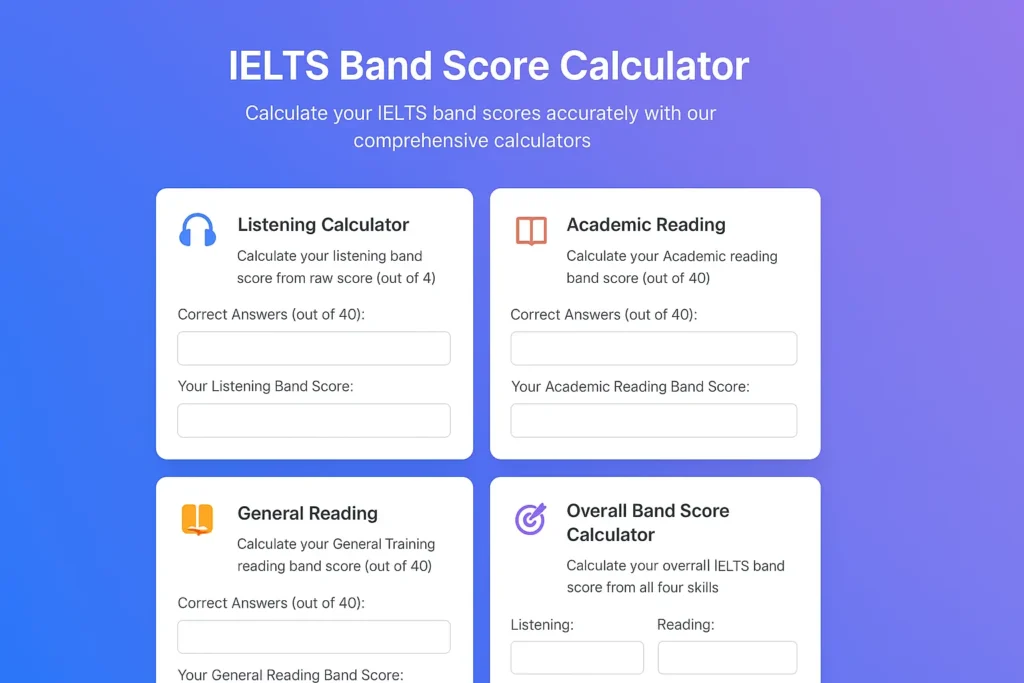IELTS Band Score Calculator
Calculate your IELTS band scores accurately with our comprehensive calculators
🎧 Listening Calculator
Calculate your listening band score from raw score (out of 40)
📚 Academic Reading
Calculate your Academic reading band score (out of 40)
📖 General Reading
Calculate your General Training reading band score (out of 40)
🎯 Overall Band Score Calculator
Calculate your overall IELTS band score from all four skills
How IELTS Band Scores are Calculated
The Listening and Reading sections are scored based on the number of correct answers out of 40 questions. Writing and Speaking are assessed by examiners using detailed criteria. Your overall band score is the average of all four skills, rounded to the nearest 0.5.
Score Conversion Tables
Listening Score Conversion
| Raw Score | Band Score |
|---|---|
| 39-40 | 9.0 |
| 37-38 | 8.5 |
| 35-36 | 8.0 |
| 32-34 | 7.5 |
| 30-31 | 7.0 |
| 26-29 | 6.5 |
| 23-25 | 6.0 |
| 18-22 | 5.5 |
| 16-17 | 5.0 |
| 13-15 | 4.5 |
| 10-12 | 4.0 |
Academic Reading Conversion
| Raw Score | Band Score |
|---|---|
| 39-40 | 9.0 |
| 37-38 | 8.5 |
| 35-36 | 8.0 |
| 33-34 | 7.5 |
| 30-32 | 7.0 |
| 27-29 | 6.5 |
| 23-26 | 6.0 |
| 19-22 | 5.5 |
| 15-18 | 5.0 |
| 13-14 | 4.5 |
| 10-12 | 4.0 |
General Reading Conversion
| Raw Score | Band Score |
|---|---|
| 40 | 9.0 |
| 39 | 8.5 |
| 37-38 | 8.0 |
| 36 | 7.5 |
| 34-35 | 7.0 |
| 32-33 | 6.5 |
| 30-31 | 6.0 |
| 27-29 | 5.5 |
| 23-26 | 5.0 |
| 19-22 | 4.5 |
| 15-18 | 4.0 |
IELTS Band Score Calculator – Work Out Your Real Score
Wondering what band you’ll actually get on test day? Stop guessing. This calculator shows you exactly where you stand right now.
I’ve been teaching IELTS for years, and students always ask me the same thing: “What’s my score going to be?” Now you can find out for yourself using the same tables the test centers use.
The Truth About IELTS Scoring
Look, IELTS scoring isn’t rocket science, but most people get it wrong. You get four separate scores – listening, reading, writing, speaking. Each one goes from 0 to 9. Your final score? Start by adding them. Then divide by 4 and then round off.
But here’s the catch – getting those individual scores isn’t always straightforward. Listening and reading use charts based on correct answers. Writing and speaking? That’s where things get messy because humans mark them.
Listening Scores – The Easy Math
Forty questions, and every answer counts. Miss one question and you might drop half a band. Here’s what you need:
- Want Band 9? Get 39 or 40 right
- Band 8.5? You need 37-38 correct
- Band 8? That’s 35-36 right answers
- Band 7.5? Get 32-34 correct
- Band 7? You need 30-31 right
Most of my students improve fastest in listening. Why? Because you can practice anywhere. Bus, gym, walking the dog – just put on some BBC podcasts.
Reading – Where Academic and General Go Different Ways
This trips up everyone. Same test name, totally different scoring.
Academic Reading (For University People)
The passages are brutal – dense academic stuff that makes your eyes water. But the scoring helps you out:
- Band 8.5 = 37-38 correct answers
- Band 8.0 = 35-36 correct
- Band 7.5 = 33-34 correct
- Band 7.0 = 30-32 correct
- Band 6.5 = 27-29 correct
General Training (Everyone Else)
Easier passages about everyday stuff. But they want more correct answers for the same band:
- Band 8.5 = 39 correct (not 37-38!)
- Band 8.0 = 37-38 correct
- Band 7.5 = 36 correct (just one!)
- Band 7.0 = 34-35 correct
- Band 6.5 = 32-33 correct
Crazy, right? The “easier” test actually needs better accuracy.
Writing and Speaking – No Magic Formula
Can’t just count right answers here. Real people mark these sections, and they look at four things each time.
Writing gets judged on:
- Did you answer the question properly?
- Is your stuff organized?
- Do you use decent vocabulary?
- Is your grammar any good?
Speaking gets the same treatment:
- Do you speak smoothly?
- Can you use the right words?
- Grammar again
- Can people understand your accent?
Each area gets a band score, and then they average it out.
What Scores Actually Matter in Real Life
University applications usually require 6.5 overall. Better schools want 7.0 or higher. Medical school? You’re looking at 7.5-8.0. Immigration depends on the country. Canada and Australia love high scores – Band 8 gets you maximum points. UK visas often need just 6.0.
Work visas vary massively. Some jobs need 4.5, others want 7.0. Check before you book your test.

How I Tell Students to Improve
There are some tips you can follow:
Listening Gets Better Fast
Stream English content constantly. News, podcasts, YouTube videos – whatever keeps you interested. British accent throwing you off? Watch the BBC. Need American? Try CNN.
During practice, read the questions before the audio starts. Sounds obvious, but half my students forget this basic trick.
Reading Needs Strategy, Not Just Practice
Time kills more reading scores than vocabulary does. You get 60 minutes for 40 questions. That’s 90 seconds per question, including reading time.
Academic test takers – start reading scientific magazines and university websites now. The vocabulary will save you later. General Training people should practice with job websites, government forms, and newspaper articles. Boring? Yes. Helpful? Absolutely.
Writing Improvement Takes Patience
Plan first, write second. Count your words. Seriously. Too few words = automatic point deduction. Task 1 needs 150+ words, Task 2 needs 250+.
Academic Task 1? Learn the standard phrases for describing graphs. “The figures show a significant increase” works better than “The numbers went up a lot.”
Speaking Confidence Beats Perfect Grammar
Record yourself answering practice questions. Most people speak too quietly when nervous. Examiners need to hear you clearly.
Don’t memorize answers. They can tell, and it hurts your score. Instead, practice talking about common topics naturally.
Practice Test Reality Check
Take complete practice tests, not just individual sections. Real test conditions mean:
- Pencil and paper (no computer)
- Strict timing
- No bathroom breaks
- All four sections in one sitting
Your practice scores give you a ballpark figure, but don’t expect perfection. Test day nerves, different questions, and room conditions all affect performance.
I tell my students to take three full practice tests minimum before booking the real thing. Look for consistency, not perfect scores.
Mistakes That Cost Points
Thinking, overall score is everything – Many places set minimum requirements for each section, too. You might need Band 7 overall AND Band 6.5 in each part.
Expecting instant improvement – Listening and reading can jump quickly with focused practice. Writing and speaking take months of steady work.
Mixing up test types – Academic and General Training reading scores mean different things. Don’t compare them directly.
When to Book Your Real Test
Don’t rush. Book when you’re consistently hitting your target score in practice tests. Not once – consistently. You should finish all sections comfortably within time limits and understand the test format inside out.
Most successful students spend 2-3 months preparing properly. Rushing usually means retaking, which costs money and delays applications.
Calculator Tips
These calculators use official IELTS tables. Your listening and reading predictions should be spot-on. Writing and speaking estimates are trickier since you’re rating yourself. Get feedback from teachers or online services for more accurate predictions.
Summary
IELTS scoring follows clear rules, but improvement takes focused effort. Track score ranges from multiple practice tests rather than banking on one good result. The test costs money and time, so prepare properly before booking. These calculators will help you know when you’re ready.
